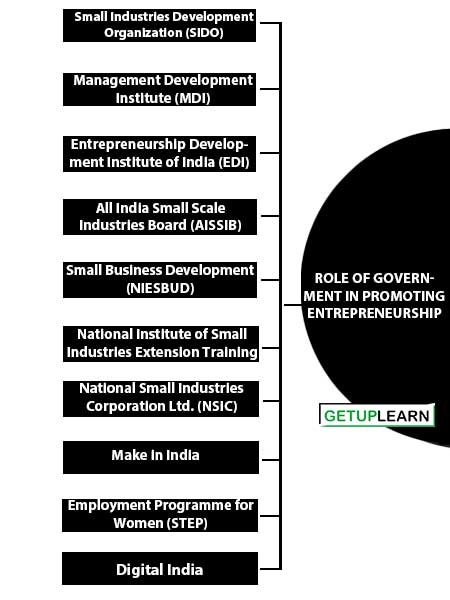Promotional agencies are organizations that are dedicated to assisting or assisting entrepreneurs in the start-up of their businesses. They essentially advertise the firm using numerous techniques in order for the entrepreneur to withstand the initial difficulties that every business encounters.
Furthermore, the majority of the strategies employed by advertising companies are proven and true, ensuring that the entrepreneurs gain. The development of entrepreneurship is critical for any country’s economy to flourish and prosper.
As a result, the government has established a number of entities to assist, promote, develop, and support entrepreneurs. Entrepreneurs are also given training to better their business and market expertise, develop their skill set, and develop a businessman attitude.
Table of Contents
-
1 Role of Government in Promoting Entrepreneurship
- 1.1 Small Industries Development Organization (SIDO)
- 1.2 Management Development Institute (MDI)
- 1.3 Entrepreneurship Development Institute of India (EDI)
- 1.4 All India Small Scale Industries Board (AISSIB)
- 1.5 National Institution of Entrepreneurship and Small Business Development (NIESBUD)
- 1.6 National Institute of Small Industries Extension Training
- 1.7 National Small Industries Corporation Ltd. (NSIC)
- 1.8 Make in India
- 1.9 Support to Training and Employment Programme for Women (STEP)
- 1.10 Digital India
- 1.11 Other Related Activities
Role of Government in Promoting Entrepreneurship
Governments spend a lot of money to foster entrepreneurship growth because it is so crucial. In order to ensure regional development, they also support businesses in rural and underdeveloped areas. They established a number of programs to assist entrepreneurs with marketing, finance, technique, and skill development in order to help them accelerate and adapt to changing business trends.
The central government has established a number of promotional agencies, including:
- Small Industries Development Organization (SIDO)
- Management Development Institute (MDI)
- Entrepreneurship Development Institute of India (EDI)
- All India Small Scale Industries Board (AISSIB)
- National Institution of Entrepreneurship and Small Business Development (NIESBUD)
- National Institute of Small Industries Extension Training
- National Small Industries Corporation Ltd. (NSIC)
- Make in India
- Support to Training and Employment Programme for Women (STEP)
- Digital India
- Other Related Activities

Small Industries Development Organization (SIDO)
SIDO was founded in October 1973 and is presently administered by the Ministry of Trade, Industry, and Marketing. SIDO is the apex organization at the central level for making policies for the development of small-scale industries in the country, and it is led by the Additional Secretary and Development Commissioner (Small-Scale Industries) under the Ministry of Small-Scale Industries of the Government of India.
SIDO is contributing significantly to the strengthening of this critical industry, which has proven to be one of the country’s strongest economic cornerstones. SIDO also offers further assistance through its Comprehensive Plan for Rural Entrepreneurship Promotion.
Management Development Institute (MDI)
Gurgaon is home to MDI (Haryana). It was founded in 1973 and is funded by the Industrial Finance Corporation of India, with the goal of increasing the industry’s managerial performance. It offers managerial training in a variety of sectors. It also contains programs for officers from the IAS, IES, BHEL, ONGC, and a number of other major public sector organizations.
Entrepreneurship Development Institute of India (EDI)
The IDBI Bank Ltd., IFCI Ltd., ICICI Bank Ltd., and the State Bank of India fund the Entrepreneurship Development Institute of India (EDI), an autonomous and not-for-profit institute founded in 1983. (SBI). EDI has aided in the establishment of twelve state-level entrepreneurship development centers and institutes.
However, one of the most satisfying results was incorporating entrepreneurship into the curricula of a huge number of schools, colleges, science and technology institutions, and management schools throughout numerous states.
In the international arena, EDI has received recognition and support from the World Bank, Commonwealth Secretariat, UNIDO, ILO, British Council, Ford Foundation, European Union, ASEAN Secretariat, and several other renowned agencies. EDI has also set up Entrepreneurship Development Centres in Cambodia, Lao PDR, Myanmar, and Vietnam and is in the process of setting up such centers in Uzbekistan and five African countries.
All India Small Scale Industries Board (AISSIB)
The Small Scale Industries Board (SSI Board) is an apex advisory body tasked with advising the government on all problems affecting small businesses. It is led by a Central Government Minister and includes representatives from the Central Government, State Governments, National Small Industries Corporations, State Financial Corporations, Reserve Bank of India, State Bank of India, Indian Small Industries Board, and non-government members such as the Public Service Commission, Trade and Industries Members.
National Institution of Entrepreneurship and Small Business Development (NIESBUD)
The Government of India founded it in 1983. It is the highest organization in charge of overseeing the actions of numerous entities involved in entrepreneurship development programs. The Government of India Society Act of 1860 established it as a society. The institute’s main operations are:
- To devise and implement successful plans and approaches,
- To create a model training syllabus that is consistent.
- Create training materials, tools, and instructions,
- Workshops, seminars, and conferences will be held.
- To assess the benefits of EDPs and to boost the entrepreneurial development process.
- Assisting the government and other agencies in the implementation of entrepreneur development programs.
- To conduct EDP research and development.
National Institute of Small Industries Extension Training
It was founded in 1960, and its headquarters are in Hyderabad. The following are the key goals of the National Institute of Small Industries Extension Training:
- Developing and coordinating syllabi for small business training.
- Guidance on managerial and technical matters.
- Putting on workshops for small business owners and managers.
- Providing research and documentation assistance.
National Small Industries Corporation Ltd. (NSIC)
The NSIC was founded by the Central Government in 1995 with the goal of aiding small businesses in government procurement programs. Through its marketing network, the organization provides a large market for the products of small businesses. It also aids small businesses in exporting their goods to other countries. Apart from the aforementioned, promotional agencies’ main goals are as follows:
-
Establishment: Promotional agencies assist entrepreneurs in setting up and establishing their businesses.
-
Funding: Promoting agencies assist firms in obtaining the cash or investment they require to launch their operation. Financial aid is necessary for any firm to get off the ground, and the organizations may help.
-
Market Research and Availability: Market research programs run by promotional organizations can assist new entrepreneurs in gaining control of changing market trends. This is critical, especially in the first phases.
- Industry Trends: Through their network and experience, promotional agencies may assist new-age entrepreneurs in learning about the newest market trends and the ever-increasing demand for better products and services.
Make in India
Prime Minister Narendra Modi introduced Make in India, a groundbreaking project of the Indian government, in 2014. Its goal is to improve the country’s local manufacturing capabilities. In addition, Make in India intends to promote both domestic and foreign investment in the country.
The initiative aims to make India a global manufacturing hub and provide employment possibilities by revitalizing the country’s sagging manufacturing industry. It is also a comprehensive program that encompasses everything from jobs to development to sanitation. Several support programs for the Make in India movement have also been launched, including:
- India’s Expertise
- India has gone digital.
- India is a startup nation.
- Cities that are smart
- Jan Dhan Yojana of Pradhan Mantri
- Atal Mission for Urban Transformation and Rejuvenation
- Sagarmala
- The International Solar Alliance’s Swachh Bharat Abhiyan is accelerating the growth of New India’s innovation.
Support to Training and Employment Programme for Women (STEP)
The STEP scheme aims to provide women in India with the necessary employability skills and competence. Its goal is to empower them by providing unique self-employment options. Handlooms, stitching, food processing, horticulture, agriculture, Zari, Embroidery, Technology, Handicrafts, and Tailoring are among the industries covered. Let’s have a look at the STEP eligibility criteria: Women above the age of 16 are eligible for the program.
Non-government or voluntary organizations formed as autonomous organizations under particular legislation or as a Society under the Societies Registration Act of 1860. Cooperative Societies are groups of people who work together to achieve a common goal. Non-profit or volunteer organizations that promote the program’s goals through credibility, funding, and experience.
Digital India
It’s a program that aims to boost the country’s technological capabilities. It’s best to think of it as an umbrella program that protects a variety of government agencies and ministries. It brings together a diverse set of concepts and ideas to form a comprehensive vision. Digital India promises to give the nine growth elements a much-needed boost, including:
- Highways with high-speed internet
- Program for public Internet access
- Mobile connectivity is available to everyone.
- E-governance
- E-Kranti is an electronic service delivery system.
- Using technology to reform government
- Manufacturing of electronic components
- Early harvesting plan
- IT in the Workplace
As we can see above, for any entrepreneur to set up and establish their venture, promotional agencies are needed. Their experience and support help in entrepreneurship development.
- Promotional Schemes:
- Reservation of items for specific manufacture in the small-scale region
- Enhancement of funding limit for export-oriented/ high-tech objects reserved for manufacture in the small-scale sector
- Price and buy desire scheme
- Protection from opposition Items of stores reserved for unique purchase
- Foreign direct investment
- Infrastructural facilities Industrial boom centers
- Export processing zone
- Industrial parks
- Integrated infrastructure improvement centers cluster improvement program National program for rural industrialization.

